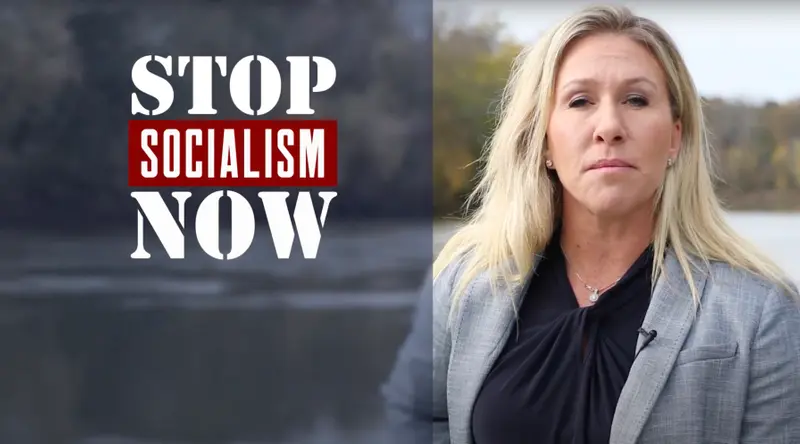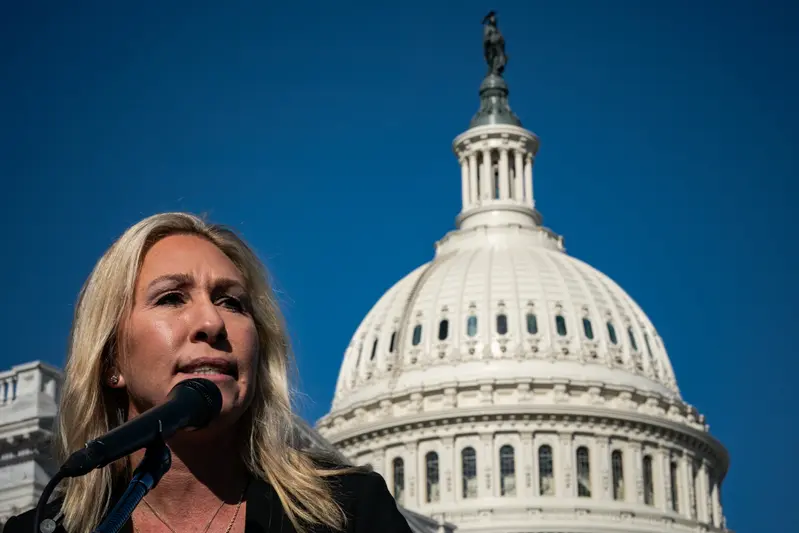Not long after her election to Congress, Rep. Marjorie Taylor Greene, R-Ga., helped raise money for a super PAC by appearing in a video ad that tests the boundaries of rules limiting fundraising by elected officials.
The ad explicitly asks for money for the Stop Socialism Now PAC, an entity that can accept unlimited donations. But candidates and elected officials are not allowed to solicit contributions greater than $5,000, according to campaign finance experts.
Greene made the ad with Rick Shaftan, a North Carolina-based consultant whose company also handled ads for Greene’s campaign and works with a gun activism group that has been closely aligned with the freshman lawmaker. Some Republicans have cut their ties to Shaftan over his history of racist remarks.
In December, Greene appeared in several ads for the super PAC leading up to Georgia’s two Senate runoffs. “It’s time to fight back now before it’s too late,” Greene said in one of the videos.
Immediately after she leaves the screen, a voice-over urges viewers to “make a contribution today.”
Stop Socialism Now PAC’s Ad


Under federal law, candidates and elected officials cannot “solicit, receive, direct, transfer, or spend funds in connection with an election … unless the funds are subject to the limitations, prohibitions, and reporting requirements” of the Federal Election Campaign Act of 1971. Super PACs aren’t subject to those requirements, as noted in the fine print on the donation webpage referenced in the Greene ad. The statute defines “solicit” as “to ask, request, or recommend, explicitly or implicitly,” that a person give money or something of value. The law says messages should be considered in context, including “the conduct of persons involved in the communication.”
Legal experts differed in their assessments of whether Greene’s appearance follows the law, depending on their views of how strictly campaign finance rules should be interpreted. The Federal Election Commission, which enforces campaign finance rules, is notoriously weak. Although the commission staff looks into complaints about violations of fundraising rules, the six-member commission, which has equal numbers of Democrats and Republicans, routinely deadlocks.
Paul S. Ryan, a campaign finance expert with the good-government advocacy group Common Cause, said he believes the Greene ad clearly crosses the line.
“This communication constitutes an illegal solicitation by a member of Congress of unlimited funds,” Ryan said. The ban on soliciting unlimited donations, he said, “becomes meaningless if a candidate can do this.”
Ryan said he’s never before seen a candidate reading a super PAC’s script in an ad that explicitly asks for money. That goes further, he said, than other instances where super PACs have repurposed footage of a candidate or hosted candidates at fundraisers that people have already paid to attend.
Political operatives have steadily pushed to blur the lines between candidates and their allied super PACs, which are supposed to be independent. Candidates regularly started showing up at super PAC fundraisers with the FEC’s blessing. Campaigns and super PACs are not supposed to share private information, so campaigns started publicly posting video that super PACs could use — in 2015, Texas Sen. Ted Cruz’s campaign famously posted hours and hours of raw footage.
The Greene ad is different because her appearance was clearly recorded specifically for the super PAC.
“Even if a super PAC can accept, a federal candidate can’t solicit — that is clear and indisputable,” said Erin Chlopak of the nonpartisan Campaign Legal Center. “The whole basis for these organizations to exist is acting independently and not in coordination with federal candidates. The weaker we make that, or the lack of rules that really require such independence, then the entire premise of why they’re allowed to accept unlimited contributions falls apart.”
The Greene ad doesn’t specify a $5,000 contribution limit, which experts say could have avoided the issue.
“My advice would be to be very clear that a candidate is not soliciting beyond those limits,” said William Minor, a campaign finance lawyer at the firm DLA Piper. Minor said the FEC has given detailed guidance about what candidates can and can’t do in relation to fundraising events, but the only rule that addresses asking for money in ads is the blanket ban on soliciting outsize donations.
Still, Jan Baran, a prominent Republican campaign finance lawyer, said he believes the ad complies with FEC rules because the solicitation for money flashes up while Greene is not on screen. She also doesn’t appear on the super PAC’s online donations page, he said.
“The ad and Ms. Greene seem in compliance since there is no solicitation by Ms. Greene and no evidence direct or indirect that impermissible [federal election] funds are being solicited by using Ms. Greene’s name or likeness,” Baran said in an email.
The Greene campaign and its lawyer, former Trump White House deputy counsel Stefan C. Passantino, didn’t respond to requests for comment. Reached by phone, Shaftan hung up. His Twitter bio says, “I no longer talk to the #FakeNewsMedia or care what you write.”
Greene voted to overturn the presidential election by objecting to the Electoral College results on Jan. 6, when a violent mob of then-President Donald Trump’s supporters attacked the Capitol. Georgia Democrats called for Greene to resign over her inflammatory rhetoric leading up to the insurrection.
In February, the House voted to remove Greene from her committee assignments for conduct such as accosting a school shooting survivor and showing support online for killing Democratic leaders. Greene said in a speech that House Speaker Nancy Pelosi could be executed for treason and liked a Facebook comment that suggested removing Pelosi with “a bullet to the head.”
Those incidents predate Greene’s election to Congress, but while in office she has provoked fresh altercations on Capitol Hill. Freshman Democrat Cori Bush of Missouri moved her office after she said Greene and her staff “berated” and “threatened” her in response to being asked to wear masks. Greene also put up an anti-transgender sign outside her office, across the hall from a lawmaker whose daughter is transgender. Last week, Greene aggressively pursued Rep. Alexandria Ocasio-Cortez, D-N.Y., outside the House chamber, falsely accusing her of supporting terrorists.
It is not clear exactly when and where the super PAC launched the ad featuring Greene. Stop Socialism Now PAC reported spending $12,000 on Dec. 4 for “digital and television advertising” against the Democratic candidates in the Senate runoffs, according to FEC disclosures. The group didn’t show up in a search of broadcast airtime by the ad-tracking firm AdImpact.
The super PAC posted the Greene ad that asked for money on its Facebook page on Dec. 3, logging more than 3,500 views. That ad isn’t one of the super PAC’s paid posts that show up in the social network’s voluntary disclosures of political ads.
FEC disclosures don’t connect contributions to any particular ad or solicitation. But the super PAC has received several donations above the $5,000 limit that applies to regular (non-super) PACs.
Cynthia B. Howalt, whose family owns a chemical manufacturing company in Greene’s district, gave $125,000 on Nov. 13. Her husband, Frederick “Chip” Howalt, told a local reporter in January that the couple wanted to increase support for Greene and oppose Republicans who didn’t vote to overturn the 2020 election. The couple didn’t respond to requests for comment.
Another large donor to the super PAC was William O. Cooley, a retired land developer in West Palm Beach, who gave $10,000 on Dec. 9. He declined to comment.
Greene’s extensive television ads, financed in part with her $1 million loan to her campaign, were key to her victory in the Republican primary last year. Her campaign has paid Shaftan’s firm, Neighborhood Research and Media, more than $665,000 for ads, polls, mailers, phone messages and calls, according to FEC disclosures. The super PAC paid the firm another $10,000.
Shaftan’s ads for Greene’s official campaign included one simulating an explosion at an enormous Confederate monument in Stone Mountain, Georgia, as Greene says, “The socialist left won’t stop until America is destroyed.” In another ad, Greene brandishes an assault rifle and appears to blow up targets labeled “gun control” and “socialism.”
Shaftan also works with a network of pro-gun groups run by brothers in Ohio named Chris, Aaron and Ben Dorr. They are also prominent allies of Greene’s. In an interview with Chris Dorr a week before the 2020 election, Greene said that if Trump lost, his supporters might resort to violence.
“Once it’s gone, freedom doesn’t come back by itself — the only way you get your freedoms back is it’s earned with the price of blood,” Greene said in a video of the interview, reported by Mother Jones. “This is it. Nov. 3, freedom is on the ballot.”
Greene planned to speak at a May 1 rally in Columbus, Ohio, organized by Chris Dorr, who told followers they could openly carry guns there. On the eve of the rally, the organizers called it off. Greene released a statement claiming state authorities refused to provide security for her.
An Ohio State Highway Patrol spokesman disputed that account, saying the police “had every intention of providing security” and had “all necessary measures in place.”
Chris Dorr didn’t respond to requests for comment. In 2019, Ohio authorities investigated and decided against prosecuting him for threatening assassinations in response to the Republican governor’s proposed gun regulations. “There could be political bodies lying all over the ground,” Dorr said in an online video. “We gun owners will pull the trigger and leave the corpse for the buzzards.”
Greene also touted the Dorr brothers’ American Firearms Association’s endorsement of a bill she introduced in Congress to block federal funding for any gun regulations. An article on the far-right website Breitbart said Greene’s bill was a response to an abandoned effort late last year by the Bureau of Alcohol, Tobacco, Firearms and Explosives to restrict equipment that makes it possible to use pistols like assault weapons. This type of weapon was later used in the Boulder, Colorado, mass shooting in March.
In April, Greene’s campaign said it would raffle off a version of the weapon. “I’m giving away the gun that triggers the Fake News Media,” Greene said in an email to supporters.
Update, May 21, 2021: The good-government advocacy group Common Cause filed a formal complaint with the Federal Election Commission citing ProPublica’s reporting and alleging that the super PAC ad featuring Greene violated the ban on candidates soliciting unlimited donations. “The United States Supreme Court has been very clear in upholding candidate contribution limits and prohibitions on candidates soliciting funds outside those limits because such contributions lead to corruption and undermine the faith of Americans in the political process,” the group’s president, Karen Hobert Flynn, said in a statement.
Do you have information that should be public about extremist members of Congress? Contact Isaac at isaac@propublica.org.

















